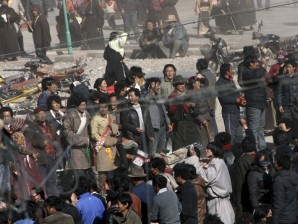
In this photo taken on Wednesday, Feb. 8, 2012, Tibetans gather on the side of a main street in Nangqian county, China's Qinghai province. Another Tibetan has set himself on fire in western China to protest government policies while thousands marched in another part of China to show support for their exiled spiritual leader, the Dalai Lama, a report said. (AP Photo)
BEIJING — Chinese security forces shot dead two Tibetan brothers who had been on the run since taking part in anti-government protests two weeks ago in southwest China, a U.S.-funded broadcaster reported Friday.
Radio Free Asia said the two — 40-year-old monk Yeshe Rigsal and his 38-year-old brother, Yeshe Samdrub — were killed Thursday in the high-altitude pasturelands used by nomadic herders where they had fled after the Jan. 23 protest in Luhuo county. Radio Free Asia cited sources in the area and in the Tibetan exile community in India.
Luhuo and other Tibetan areas of Sichuan province have been sealed off due to recurring, sometimes violent protests, so the Radio Free Asia report could not be independently confirmed. Telephone calls Friday to the Communist Party propaganda department and the public security office in Luhuo rang unanswered, as did a call to the party propaganda department in Ganzi prefecture, which oversees the county.
In the Luhuo protest, Tibetans besieged a police station, drawing fire that killed at least one person. It marked a return to the mass anti-government demonstrations periodically used by Tibetans in recent decades to protest Chinese rule. A widespread rebellion across Tibetan areas in 2008 prompted China to smother the region with police and tighten controls on the Buddhist practices and the clergy that are at the core of Tibetan identity.
As a result, Tibetans have felt further alienated, but largely turned to individual acts of protest, most dramatically by setting themselves on fire. At least 17 Tibetans have done so in the past year, many shouting as they burned for the return of their spiritual leader, the Dalai Lama, from his exile in India, where he fled in 1959.
Radio Free Asia also reported another immolation — that of a yet to be identified monk Thursday in Yushu, another restive Tibetan area in Qinghai province, next to Sichuan.
In another protest, several hundred monks from Sekha monastery in Yushu staged a demonstration Thursday, holding banners and shouting slogans demanding human rights and the release of political prisoners, according to accounts from overseas Tibet lobbying groups and a video provided by a person with contacts with the Tibetan community.
The person said that the monks originally planned to march to the county seat more than a mile (2 kilometers) away, but that local herders stopped them, worrying that the monks would be arrested. Officials, police and troops arrived and persuaded the monks to return to the monastery, said the person, who did not want to be identified for fear of being punished by the authorities.